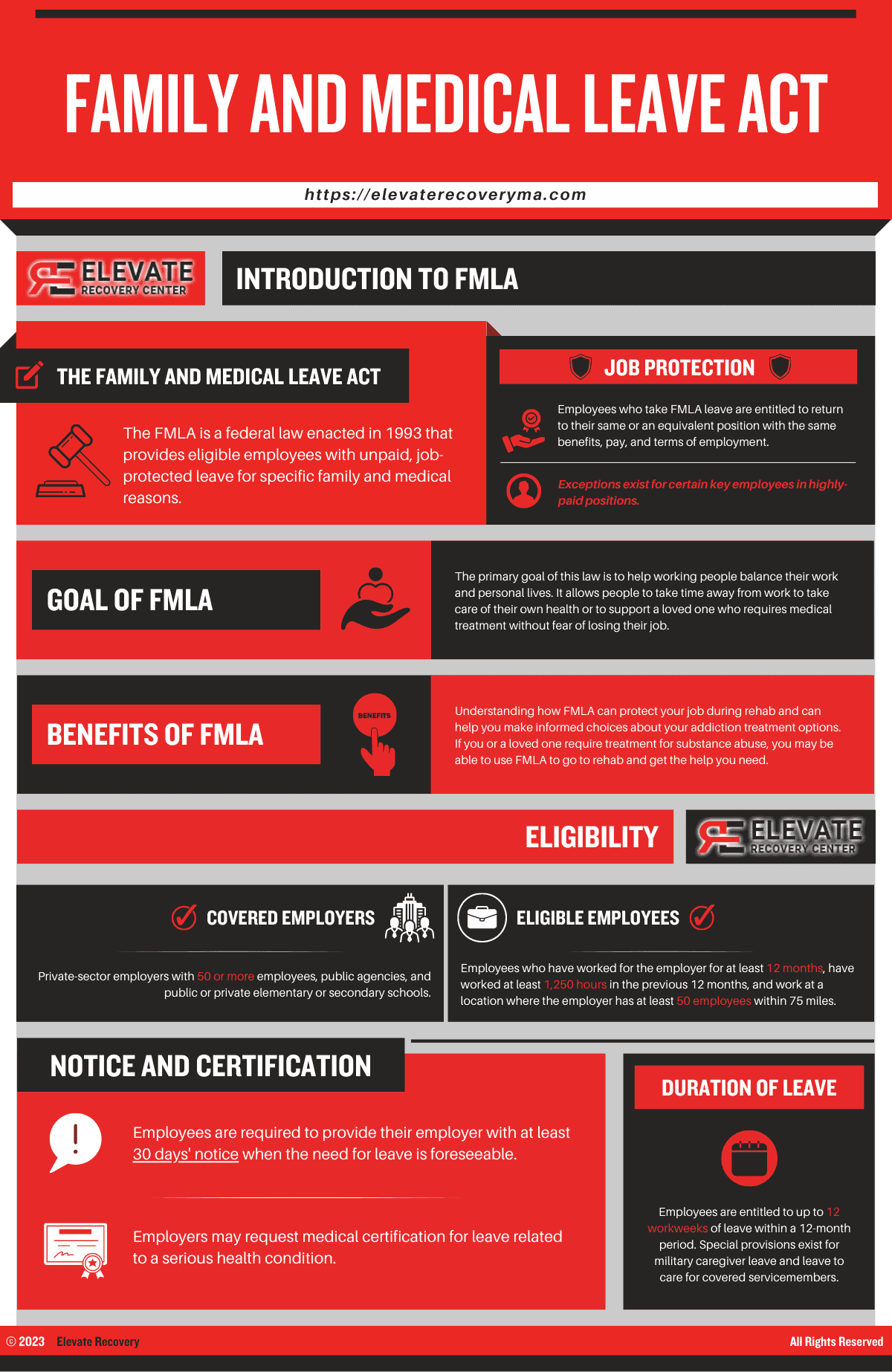While addiction is becoming increasingly common, it is never an easy disorder to recover from. Recovering from addiction can even seem impossible when you are the sole financial provider for your family. Many people avoid attending treatment because they are afraid they will lose their job if they take time off to go to rehab.
While this is a valid fear to have, it should never prevent you from seeking the help you need. Thankfully, there is a law in place that can protect your job while you receive addiction treatment. It’s called the Family and Medical Leave Act (FMLA) and can provide you with unpaid leave while you seek addiction treatment.
What is the Family and Medical Leave Act (FMLA)?
The Family and Medical Leave Act (FMLA) is a federal law that was passed in 1993 to ensure that everyone who needed medical treatment could access it without fear of losing their job or their health insurance. The FMLA entitles eligible employees of covered employers to take unpaid, job-protected leave for specified family and medical reasons.[2]
If you are eligible for the FMLA, you will be allowed to take up to 12 unpaid weeks of medical leave for a variety of reasons, including:
- The birth of your baby
- Upon the placement of an adoptive or foster child in your home
- Taking care of a seriously ill family member or spouse
- Taking care of your own serious health condition
Anytime you use the FMLA your employer must be notified. When notifying your employer that you are taking time off, you must inform them that you are using the FMLA, how you qualify for the FMLA, and the amount of time you will be taking leave. This ensures that you will be granted job protection under the law.
Is Addiction Considered a “Serious Health Condition” Under the FMLA?
If you are thinking about using the FMLA to receive treatment for your addiction, you might be wondering whether that is allowed. Because the FMLA uses the broad term “serious health condition” it can be difficult to determine whether addiction qualifies under this law. Thankfully, the FMLA does consider addiction a serious health condition and therefore will protect your job while you receive treatment.
Under the FMLA, examples of serious health conditions include:
- Chronic back conditions
- Severe arthritis
- Cancer
- Diabetes
- Emphysema
- Pregnancy
- Multiple sclerosis
- Pneumonia
- Mental health conditions like depression, bipolar disorder, post-traumatic stress disorder, and more
- Substance use disorders
To make things simple, the FMLA defines “serious health conditions” as an illness that prevents you from being able to carry out the tasks necessary for your job. When it comes to using the FMLA for mental health, your condition must be severe enough to require inpatient or residential treatment. This means that outpatient therapy is not enough for you to recover, making it necessary for you to take time off to attend inpatient treatment.
Do You Meet the Eligibility Requirements of the FMLA?
If you are going to use the FMLA to attend addiction treatment, you must determine whether you meet the requirements first. Thankfully, most people in the United States meet the requirements to use the FMLA, however, it is important to double-check.
To be eligible for the FMLA, you must:
- Work for a covered employer
- Work for your company for at least 12 months
- Have worked 1,250 hours during the 12 months
- Work with a company that has at least 50 employees in a 75-mile radius
The FMLA requires you to work for a covered employer, but what does that mean? According to the U.S. Department of Labor, a covered employer is a:[3]
- Private-sector employer, with 50 or more employees in 20 or more workweeks in the current or preceding calendar year, including a joint employer or successor in interest to a covered employer;
- Public agency, including a local, state, or Federal government agency, regardless of the number of employees it employs; or
- Public or private elementary or secondary school, regardless of the number of employees it employs.
Thankfully, this covers most jobs and companies in the United States. If you require addiction treatment, you can most likely use the FMLA to take time off and ensure that you will have a job to come back to.
Get Help for Drug Addiction and Alcoholism Today
If you or a loved one struggle with drug addiction or alcoholism, it’s time to seek professional help. Whether you are using the FMLA to keep your job or not, Elevate Recovery is here to help you. Our top-rated addiction treatment program can provide you with all of the tools and support necessary to maintain long-term recovery.
To learn more about our drug and alcohol rehab programs, contact Elevate Recovery today.
References:
- The U.S. Department of Health and Human Services (HHS): SAMHSA Announces National Survey on Drug Use and Health (NSDUH) Results Detailing Mental Illness and Substance Use Levels in 2021, Retrieved July 2023 From https://www.hhs.gov/about/news/2023/01/04/samhsa-announces-national-survey-drug-use-health-results-detailing-mental-illness-substance-use-levels-2021.html
- The U.S. Department of Labor: Family and Medical Leave Act, Retrieved July 2023 From https://www.dol.gov/agencies/whd/fmla
- The U.S. Department of Labor: Employer’s Guide to The Family and Medical Leave Act, Retrieved July 2023 From https://www.dol.gov/sites/dolgov/files/WHD/legacy/files/employerguide.pdf


